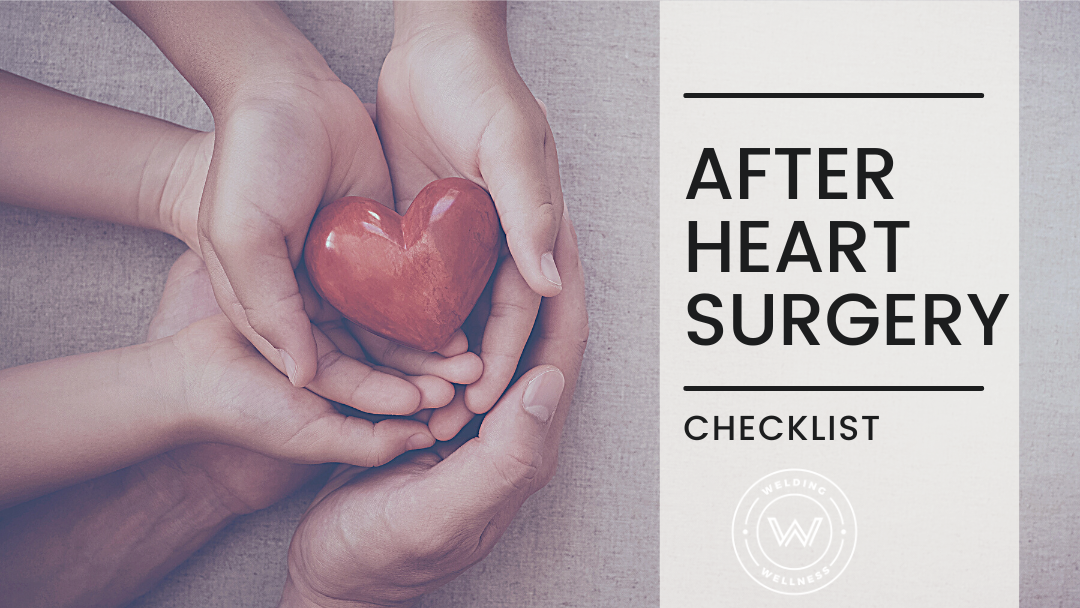
Whether you are preparing for a coronary artery bypass, a valve replacement, or pacemaker insertion, your recovery from heart surgery is as unique as you are. You might find that after surgery, you feel pain, tenderness, or soreness, interwoven with moments that you feel ok. Everyday movements that you were used to might not feel the same. You wonder why you are having more frequent mood swings and are unsure what’s causing your sudden drop in appetite. It’s ok! Believe it or not, some, if not ALL of these can be part of the healing process.
It may take up to 4-6 weeks to heal and usually even longer to start feeling better. This after heart surgery checklist was designed to help you prepare your environment at home. These products and suggestions are to provide comfort, minimize lifting, ensure adequate nutrition, and set you up for success on your road to recovery.
Disclaimer:
This list is a compilation of some of my favorite suggestions and ideas from around the internet. Some external links on this page are affiliate links, meaning if you click an image/link and make a purchase, I earn a commission at no extra cost to you. My recommendations for this list are based upon products or services that I feel could help you on your heart health journey. Please don’t spend any money on these products unless you believe they will help you achieve your goals.
At Home
Depending on your living arrangements and layout of your house, you could be spending a majority of your time in your living room or bedroom. Do a run-through of your house PRIOR TO your heart surgery.
- Do you have enough room to walk around safely? Are there visible tripping hazards such as an uplifted rug or cords? If so, remove or stow them away.
- Are you comfortable moving from a sitting to a standing position?
- Move your pots and pans from lower to higher shelves or within an area you can easily access without bending or lifting too much.
- Can you have a family member or friend stay with you for a few days?
Check out the Before Heart Surgery Checklist to see tips and tricks for setting up your home for a successful recovery.
Living Room/Bedroom
Your humble abode. These two areas are where you are most likely going to be spending most of your time. Make them as cozy and comforting as possible! Here are some suggestions.
A heart pillow will be your best buddy during the recovery process and help catch an unsuspecting laugh, cough or sneeze. An electric recliner can help you transition from a seated to an upright position and assist you in minimizing the use of your upper body and arms following surgery.
Phone Charger
Having a long phone charger or portable charger can assist in making sure your battery never runs out. Your phone can be your lifeline to your family and friends, a telehealth visit to your healthcare team, and your speaker to listen to your favorite music or podcast.
Bathroom
Using the bathroom may not be an issue for you but for some others, it might be. Surgery can cause additional bloating, gas and indigestion as well as pain medications/combo of medicine can make you prone to constipation. Having easy access to your bathroom can make you feel more comfortable and less rushed to make it there in time. A commode can also be placed close to you if your bathroom is a further distance away or it can be place over the toilet to assist you with sitting and standing.
If you find that you are growing more winded during your shower, have a seat! A shower bench can assist you in bathing and taking time to gently wash your incision with soap and water. If you find it too challenging to take a shower in the first few days, utilize cleansing wipes (NOT ON YOUR INCISION(s) or SURGICAL WOUNDS) or dry shampoo to help you feel refresh. Lastly, a stool softener can help prevent straining if you are finding that you haven’t had a bowel movement in 2+ days.
Additional helpful items
Hydration, along with balanced nutrition, is key to help you recover from heart surgery. A reusable water bottle, such as Hydro Flask, can make it less cumbersome to encourage you to drink fluid throughout the day. Fluid is important to support your recovery, have healthy and regular bowel movements, maintain blood pressure, and help you take your medicine. Speaking of which, it’s essential that you take your medication as prescribed by your doctor. A pill organizer can help you organize your medicines by week, by day, and add them to the time of day you take them (am or pm). I like that it also gives you the ability to have the option to take one day with you instead of all of your medication for the week.
Clothing
Choosing clothing can be essential. Think comfort meets practicality. Opt for loose-fitting button-up shirts or larger t-shirts with extra neck and arm room to fit over your head with minimal struggle. Having drawstring or elastic-banded shorts and sweatpants can make it easy to change or go to the bathroom. Make sure your pants are not too long because you risk tripping over them.
Pro Tip: If you find that your t-shirt is sticking to your incision, do not rip it off! Dampen your t-shirt gently with water. Then, gingerly peel your t-shirt away from your incision. It will be less painful and help ensure the scabbing is not removed as you heal.
Men’s
Underwear
Socks
T-Shirts
Shorts
Sweatshirts
Sweatpants
Women’s
Underwear
Bra
Socks
T-Shirts
Shorts
Sweatshirts
Sweatpants
Additional Recovery Tips & Tricks
- Your heart is an amazing organ, and your surgeon and healthcare team were the mechanics that just rebuilt your engine. Now, it’s time to continue to take care of that engine through fueling with nutrition for recovery and healing, reducing stress, and slowly increasing your mobility, movements, and activity level.
- Give yourself some grace! This is going to be a marathon, not a sprint. Trust the process, and trust in yourself!
- Let others help you. It can be difficult to ask for help, but let those who love and care for you, just do it. It’s one of the greatest gifts they can give you and that you can give yourself.
- If the mental bell tolls (which it will, at some point in your recovery), know that there are services to help support you. Counseling sessions, online therapists, and heart disease support groups can provide a platform to help discuss your thoughts, feelings and emotions. You are never alone in this journey!
- If you are apprehensive or unsure of the pains or symptoms that you are experiencing post-op, consult your healthcare team. The worries, fears, and uncertainty surrounding your recovery are true and real, and I’d much rather you call or take a trip to the ER than to dismiss them when it could be something much worse.
